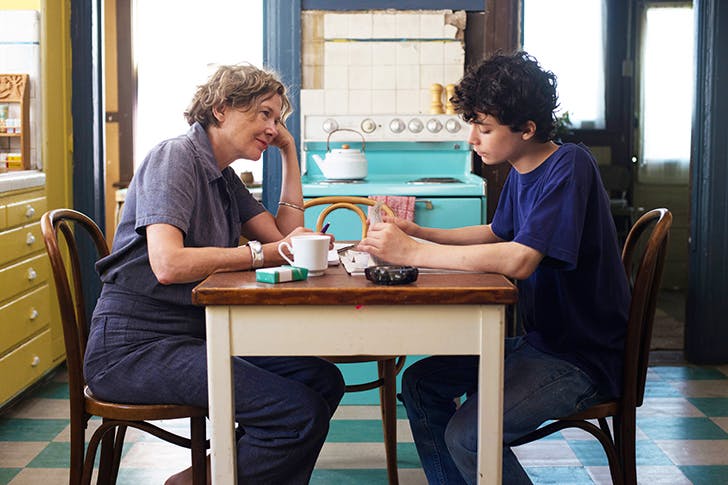Unlike with buses, you wait ages and ages for one fabulous film as framed by the older female perspective to come along and then there’s absolutely no saying when the next one will be, or if there will ever be another. (Indeed, a recent study of 2,000 films found that women in the 42–65 age bracket are given less and less to say while dialogue for men of the same age actually increases.) So don’t let this pass, and don’t do so having dismissed it as ‘a feminist film’ because it’s emotionally smart about everybody. It just takes in that portion of the human race usually left out, is all.
20th Century Women is written and directed by Mike Mills, whose previous film, Beginners (2011), paid homage to his father, who came out as gay at 75 and was portrayed by Christopher Plummer in an Oscar-winning performance. This time round, it’s a film loosely based on his mother, Dorothea, as played by Annette Bening who, for her performance, deserves thousands and thousands of Oscars — tipped on to her lawn, flung into any open window, laid by her breakfast setting every morning — but didn’t even earn a nomination. You may draw your own conclusions. I have drawn mine.
The film is set in Santa Barbara, California, in 1979, when Dorothea is 55 and her son, a version of Mills now called Jamie (Lucas Jade Zumann, a true find), is 15. Dorothea is divorced, and Jamie’s father phones on his birthday and at Christmas but they’ve lost touch, pretty much, so she’s raising him on her own. Dorothea grew up in the Depression, wanted to be a pilot, now works as a draughtswoman in an all-male office. She lives in a sprawling, ramshackle house and rents out rooms. One tenant is Abbie (Greta Gerwig), who is into photography and punk and has already survived cervical cancer. The other is William (Billy Crudup), a fortysomething hippy-ish mechanic and handyman who will offer Jamie his best advice — ‘Never have sex with just the vagina… you have to have sex with the whole woman’ — which may or may not be on the money. (Some days, I find just the vagina will do.) Next door lives Julie (Elle Fanning), the sweet but troubled and promiscuous teen who is Jamie’s best friend.
There is no straight narrative arrow. There is no set-up, conflict, resolution. The film meanders expansively. It consists of a series of vignettes as the social transitions of the time are documented via archive footage, and as Dorothea grapples with punk music — ‘It’s really interesting what happens when your passion is bigger than the tools you have to deal with it,’ explains Abbie — and worries about whether she’s raising Jamie right; whether she’s raising him to be ‘a good man’. She recruits Abbie and Julie to help her, which leads to Jamie reading Abbie’s feminist tracts, and lecturing the boys at the skate park on ‘clitoral stimulation’. (Yeah, that’ll also do. Nice work, Jamie.)
There is too much here to do justice to in a review. The characters are never one thing or another, and Dorothea is never a foregone conclusion. She may react delightedly when you expect her to react angrily, and angrily when you expect her to be delighted. She understands that Jamie is growing away from her. She reaches to touch his hair and he bends away. This is painful. This is the great maternal hurt. But, interestingly, he seeks to understand his mother just as she seeks to understand him. He asks difficult questions: ‘Do you think you’re happy, like as happy as you thought you’d be when you were my age?’ He tries to connect with her situation. He reads to her from ‘It Hurts To Be Alive and Obsolete’, Zoe Moss’s 1970 essay on women and ageing. He expects her to identify with it, but it just makes her cross, perhaps because she does. There are no surface meanings here. It is complex, like life. Dorothea doesn’t know: should she be within the emotional reach of her son? Or is it better to be just ‘mother’?
You care about everyone and their trajectories. And while all the cast are sublime, this is Bening’s film. She is incredible. It is a performance of the utmost nuance. You can sense every feeling brewing, and the loneliness buried beneath the efficiency. And unlike, say, Natalie Portman’s Jackie Kennedy, you can’t see any of the exertion behind it and unlike, say, Natalie Portman’s Jackie Kennedy, you don’t want to scream ‘Enough!’ after 90 minutes. Some have said it’s astonishing that a man can write so well about women, but I don’t know. Ibsen’s Nora was pretty good. So don’t let this pass, and if you do? You’ll have quite the wait for the next one to come along. Bring sandwiches.
Got something to add? Join the discussion and comment below.
Get 10 issues for just $10
Subscribe to The Spectator Australia today for the next 10 magazine issues, plus full online access, for just $10.














Comments
Don't miss out
Join the conversation with other Spectator Australia readers. Subscribe to leave a comment.
SUBSCRIBEAlready a subscriber? Log in